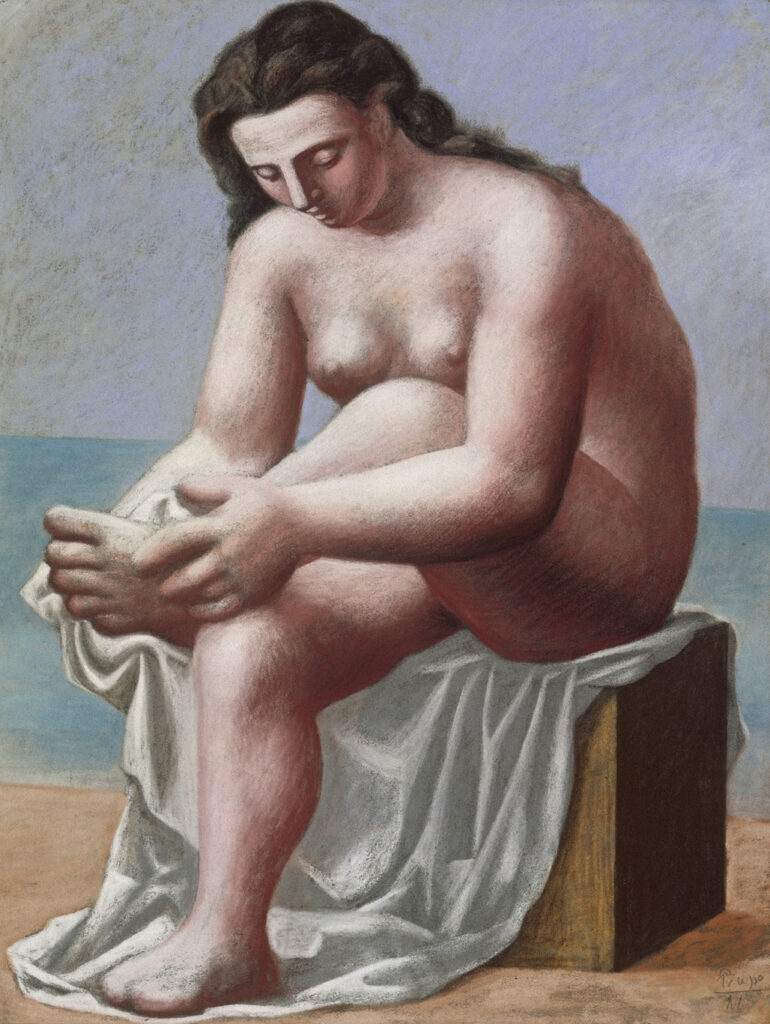
Woman’s Head, Picasso, credit Wikipedia
Six Poems Concerning An Affair
Near Waterloo Bridge
I’m not sure why I did it.
She’d said something self-deprecating
This young girl; semi-star-struck, smitten;
Who’d taken me to some hippy pub in Lower Marsh.
Theatrical props, psychedelic paintings,
All wrapped-up in Victorian brick.
I put my arm around her
And kissed her on the top of the head
And in that moment I felt every muscle
In her body relax,
Every anxiety evaporate
Like Jasmine steam from an evening bath.
Fallow-blonde hairs against my chaffed March lips
Seemed to sink down, like a blanket
Onto the safety of a warm bed.
In that dim-lit cellar
Life itself seemed as psychedelic as the paintings,
But as certain as the Empire brick.
A Nose for History
As they gathered at St Mary the Virgin
That crisp Harvest Festival evening
Just for an hour or so
It was 1662.
The language, the rituals, even the must
Were the same
And like those Civil War re-enactors
With real ale fetishes
And far too many folk music CDs
They were one with their ancestors;
A hundred hands reaching back to the Restoration.
Which brings me to your nose.
In the Old Alresford of 1662
I can hear some burring yeoman
Leaving his acres at dusk
Even he’d see it: “I suppose
“Your knows ‘er nose is your nose!
“That’s why you likes it so!
“It says in Song o’ Songs:
‘Your nose is like the Tower of Lebanon
‘Lookin’ towards Damascus.’
“Even they know’d the allure
Of a nice, sharp nose!”
It’s also his nose. And his wife’s.
And with that nose
Like the re-enactors now imbibing at The Bell Inn
Or the Hampshire worshippers receiving bread and wine
We connect with our ancestors
An unbroken proboscis-al line
Whispering: “Keep it going!
“It’s your duty to us!
“Keep it going, little organism!
“Keep it going!
It’s All in the Detail
When I was nineteen
Sat on my bed in my Georgian college
Reading Fundamentalism by James Barr,
In the sandstone beyond my window
I saw a face.
At first it was a mountain troll
From 80s children’s book Sir Crispin and the Dragon,
But soon, in a moment that lasted 45 minutes,
It was the face of God.
“It doesn’t matter,” He said.
“I know,” I replied, and began to drown
Under waves of frightening joy.
It hit me like a different wave; saline, polluted
When you told me, mid well-read, pensive conversation,
Just how young you were. Young enough
To be excited about sandcastles
While I was booking weekend breaks with Ryan Air.
Too you to know Sir Crispin and the Dragon.
When I was nineteen, only just conceived.
But you’d appreciate the detail of what
Fundamentalists call my “testimony.”
Precise age. Exact book. Length, down to the minute.
Source for the face in the stonework.
And you’ve felt the intensity of that January day:
The same elation; the same despair,
The same lightless depths,
The same rhapsodic heights.
It’s so improbable that two such spectrum dancers,
Two halves of the most neuro-atypical Platonic hermaphrodite,
Would even meet,
So how could they be
The same age as well?
And you’d get that reference;
Arnold, Carlyle, and a thousand others.
You could be two decades younger,
Single or married,
Beautiful or plain.
Falling for you has been like
Being in that student room all over again.
You feel what I feel:
The patterns, the details; the same.
And everything else?
“It doesn’t matter.”
Two Ophelias
That afternoon, as we’d stiled to the River Swere,
Delicately rippled by bright blue dragon flies and cataracts,
We joked – or did we half joke? – about ending it here.
What if they found us, together, floating, peaceful-faced?
Like two Ophelias in that painting by Millais?
The whole affair would unravel
Like Ophelia’s violet, loosestrife necklace,
But we would have preserved this day; this feeling
That it’s all so right,
That we found each other at least,
Gleamed as one, like the afternoon light,
On this Oxfordshire stream,
Through just the same tributaries of life.
“We’ll never top this,” we thought.
“So why not lie down like Ophelia?”
“What else is left to feel now?”
A while later, we wrote our names
In the visitor book in Swerford’s thirteenth century church
In the same line, mine above yours,
As though to tell History
That our love existed
Here. In this place.
If they’d found us,
Pallid, drifting down the Swere,
They’d find that entry.
They’d understand.
Love Conquers Age
The vague religious expectations of the godless
Had rained pink confetti round the King’s Men stones:
Their mid-summer belief in synchronicity; wonders,
But then we experienced our own.
We were nestled in the grass, sharing blackberry wine.
We knew they were us and they, too, had us read,
As the Sophie and John of a few years before,
With Sarah, their baby; it didn’t need to be said.
We bonded at once. Of course, offer of ride.
Academics both, surely: “She’s Trinitarian!” quipped John, on cue,
As we tried to stop Sarah from crying,
Having talked of the heretics who met at Great Tew.
At Moreton-in-Marsh, she dropped off her “friend.”
Twenty-five years older? They meet each fortnight
And he melts into Sarah. The “vibe” said “together.”
It didn’t need to be asked; it was magnesium-bright.
We knew. And they knew. God was playing a game.
She adored Beggar’s Opera; Polly; Macheath.
Highwayman, ardent, by the world jaded,
Reprieved from the gallows to wed his dear nymph.
Her research? Adultery in Dante’s Inferno.
Deep into her subject; not dry and afar.
We’d thought of ourselves as Francesca and Paolo.
We all knew who we were in that cluttered old car.
It was like they’d been sent to show us, somehow:
Love conquers age, marriage, and this can be you.
You’ll need to learn babies can swallow! You did ask!
But maybe this fact, once, to Sophie, was new,
And John laughed; John who has kids so much older?
John who rushed? I’m not just projecting on him.
They’d been sent to show us that this really will be,
And we, to reassure that there are others like them.
History’s Glow
Somehow, with us, they’re always found,
The tiny piece of verdant ground
With roses white or burdock wild;
Just something fragile, undefiled,
Or redolent of a more sacred time:
Art Deco gables midst “vibrant” grime,
Turpin’s heath, where gibbeted spirits wander;
Hanged at Tyburn for their plunder.
Amid the nauseous post-War sprawl
We toured a tiny Hindu hall;
A temple, a pathway to the One,
By kebab shops, under a jet-smogged sun.
Then as that sun began to set,
A Victorian viaduct our eyes met,
Ornate décor, its station’s charms
Were clear from our bench at The Bulstrode Arms,
And under the arch, once we’d left our seats,
We spied a flock of parakeets,
Nesting high, at the sunset mark,
In the lofty elms of Lampton Park.
So we sat near a tree trunk on the grass
And wished this moment would never pass,
Just talking, where the old oak fell,
But return, we must, to our airport hotel:
Garish, soulless, sordid, grey,
We had no choice, we had to stay,
To clutch one secret, precious night
As one; completed, set alight.
I knew we’d do it, I don’t mean to crow:
Together we find what lies below,
What lies beyond: beauty, History’s glow,
And even there; even in Hounslow.

Pastell auf Papier (1921)
Pablo Picasso, Nude Seated, credit Wikipedia










